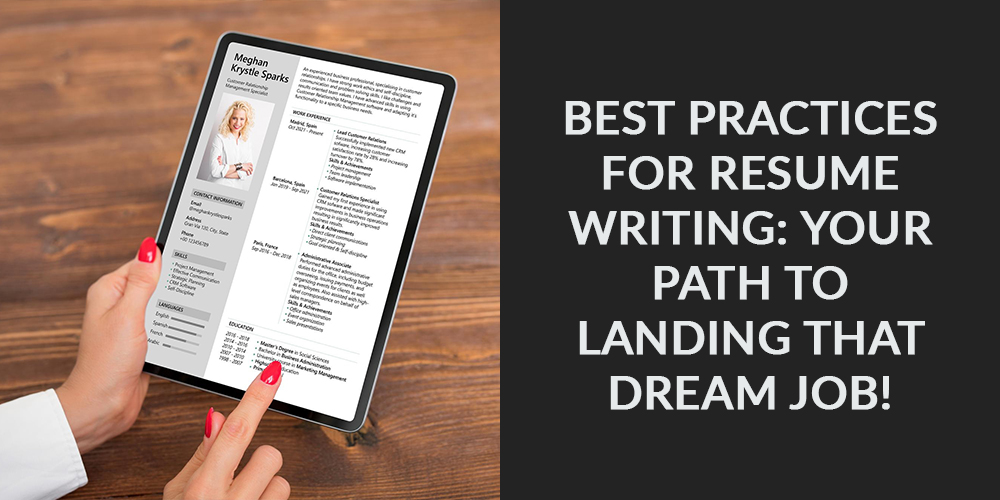Best Practices for Resume Writing: Your Path to Landing That Dream Job
If you’re on the hunt for your dream job, you know how important it is to have a stand-out resume. Believe it or not, there are ‘best practices’ that you can adopt when job application writing that will set you apart from your competition. Let’s dig into some tips and practical advice to create a winning resume that showcases your skills and achievements effectively.
Best Practice #1: Tailor Your Resume for Each Job Application
First things first, resist the urge to send the exact same resume for every job. Instead, customise it to fit each specific job you apply for. Take a good look at the job description and pinpoint what the employer is seeking. Next, tweak your resume to highlight the skills and experiences that are most relevant to that role. This shows the employer you’re the perfect fit for the job!
Let’s say you’re resume writing for a marketing position. If the job description emphasises social media marketing and content creation, make sure to mention your expertise in these areas. You could write, “Proven track record in developing engaging social media campaigns and creating compelling content that drives brand awareness.” By doing this, you show the employer you’ve got what it takes to ace the role.
Best Practice #2: Create a Powerful Professional Summary
Picture this: the hiring manager is skimming through a stack of resumes, and yours catches their eye with a captivating professional summary! Your summary is like the enticement on the back of a great novel – it needs to hook the reader and leave them wanting more. Highlight your strengths and career goals right at the start.
Here’s a pro-tip for your professional summary: use crucial SEO terms relevant to the position. For example, if you are job application writing with the aim of scoring a sales related job, using terms like ‘sales representative’, ‘account rep’ or ‘business development manager’ to boost your resume’s online visibility. For example, “Results-driven Sales Representative with a passion for exceeding targets and building lasting customer relationships. Seeking opportunities to leverage my proven track record as a Business Development Manager in driving revenue growth and delivering exceptional customer experiences.” The use of these important keywords makes your resume even more search-friendly which means you get seen by more prospective employers.
Best Practice #3: Emphasise Your Achievements with Quantifiable Results
Remember when resume writing that the one thing which makes employers really sit up and take notice is numbers! Yes, they love seeing quantifiable results. Don’t just list your job duties; showcase your accomplishments with concrete metrics to back them up.
Let’s say you worked as a store retail manager. Instead of saying, “Responsible for improving store sales through effective training and sales strategies”, try something like “Implemented a new sales training program that resulted in a 15% increase in overall store sales within the first quarter of implementation.” Your achievements are now speaking volumes and painting a clear picture for the employer of what you might achieve if they take you on.
Best Practice #4: Keep it Concise and Professional
When it comes to resume length, keep in mind how many resumes the employer is having to read and keep it short! Aim for one or two pages at most in your resume writing, focusing on the most relevant information. Avoid going into excessive detail about every job you’ve ever had. Stick to the highlights that align with the job you’re applying for.
Avoid cluttering your resume with irrelevant information or using multiple fonts and colors that distract from your content. Professional job application writers employ a clean and professional design with an easy-to-read font and consistent formatting throughout. This well-structured, visually appealing resume writing style makes it easier for employers to quickly find the information they need.
Best Practice #5: Proofread Meticulously
Good resume writers never underestimate the power of proofreading! Check for any grammatical errors, typos, or misspellings. A single typo can leave a negative impression on employers. Also, ensure consistency in verb tenses and formatting throughout your resume. Don’t solely rely on spell-checkers; they may not catch everything. Reading your resume out loud or asking someone else to review it for you will help catch mistakes you might have overlooked.
Best Practice #6: Be Honest and Authentic
Authenticity is key! Represent your skills and experiences accurately. Don’t exaggerate or provide misleading information. Employers appreciate honesty, and if you’re caught misrepresenting yourself, it can damage your chances of getting hired, or even worse, you may find yourself unemployed if cannot deliver on things you stated you could do. Of course you should always highlight your accomplishments, but be truthful about your abilities. Be prepared to discuss your experiences in more detail during interviews. Honesty will earn you trust and credibility with employers.
There you have it, my friend! These best practices and practical advice for resume writing are the secret sauce to creating a resume that’ll get you noticed by employers. Remember to customise your resume for each job application, create a captivating professional summary, and highlight your achievements with impressive numbers. Keep it concise, professional, and error-free while staying true to yourself.
Remember, the goal is to present yourself as a qualified and confident candidate. By following these guidelines and injecting your own personality into your resume, you can create a resume that grabs attention, showcases your strengths, and lands you that coveted interview. Good luck with your resume writing journey to ace that dream job—you’ve got this! Happy job hunting!

